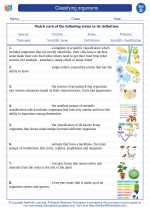Classifying organisms -> organelles
Organelles
Organelles are specialized structures within a cell that perform specific functions. Each organelle has a unique role in maintaining the cell's survival and carrying out its activities.
Nucleus
The nucleus is the control center of the cell. It contains genetic material (DNA) and directs the cell's activities.
Cell Membrane
The cell membrane is a protective barrier that surrounds the cell. It regulates what enters and exits the cell.
Endoplasmic Reticulum (ER)
The endoplasmic reticulum is involved in the production of proteins and lipids. It can be rough (with ribosomes) or smooth (without ribosomes).
Ribosomes
Ribosomes are the site of protein synthesis in the cell. They can be found attached to the rough ER or floating freely in the cytoplasm.
Golgi Apparatus
The Golgi apparatus processes, packages, and distributes proteins and lipids within the cell.
Mitochondria
Mitochondria are the powerhouses of the cell, producing energy in the form of ATP through cellular respiration.
Chloroplasts
Chloroplasts are found in plant cells and are involved in photosynthesis, converting light energy into chemical energy (glucose).
Vacuoles
Vacuoles store water, nutrients, and waste products. They are larger in plant cells than in animal cells.
Lysosomes
Lysosomes contain digestive enzymes and break down waste materials within the cell.
Cytoskeleton
The cytoskeleton provides structure and support to the cell, as well as facilitating cell movement and transport within the cell.
Study Guide
Here are some key points to remember about organelles:
- The nucleus is the control center of the cell.
- The cell membrane regulates what enters and exits the cell.
- The endoplasmic reticulum is involved in protein and lipid production.
- Ribosomes are the site of protein synthesis.
- The Golgi apparatus processes and packages proteins and lipids.
- Mitochondria are the powerhouses of the cell, producing energy.
- Chloroplasts are found in plant cells and are involved in photosynthesis.
- Vacuoles store water, nutrients, and waste products.
- Lysosomes contain digestive enzymes and break down waste materials.
- The cytoskeleton provides structure and support to the cell.
◂Science Worksheets and Study Guides Fourth Grade. Classifying organisms

 Worksheet/Answer key
Worksheet/Answer key
 Worksheet/Answer key
Worksheet/Answer key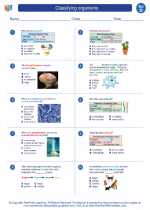
 Worksheet/Answer key
Worksheet/Answer key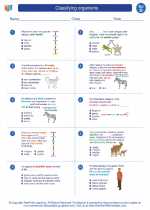
 Vocabulary/Answer key
Vocabulary/Answer key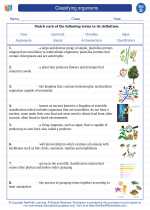
 Vocabulary/Answer key
Vocabulary/Answer key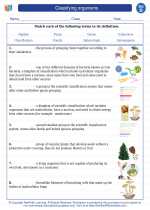
 Vocabulary/Answer key
Vocabulary/Answer key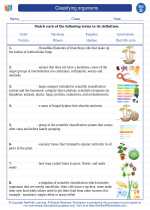
 Vocabulary/Answer key
Vocabulary/Answer key